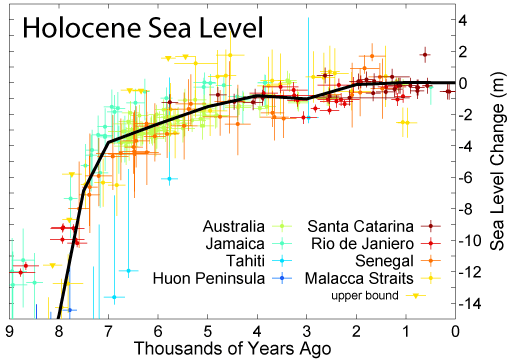Factor 10
9,000
9,000 is arguably the most important number in Plato’s Atlantis narrative. It is found in Critias 108e describing the number of years between the war with Atlantis and the time of Solon’s visit to Egypt. However, in Timaeus 23e it is also given as the number of years since the foundation of Athens.
Taken at face value, it implies that around 9600 BC Atlantis launched an attack on Athens and Egypt. However, archaeologically this makes no sense as the is no evidence of structured societies at either location until many thousands of years later.
Nevertheless, it should be noted that when Greek numerical notation was developing, 9,000 was the largest value that could be expressed by a single character. Later, it was sometimes used to describe a large but indefinite amount. A Bible study site tells us that “The use of definite numerical expressions in an indefinite sense, that is, as round numbers, which is met with in many languages, seems to have been very prevalent in Western Asia from early times to the present day.”(a)
This apparent contradiction has baffled commentators for centuries. The ancient Egyptians had three calendars, solar, lunar and seasonal. As the solar years made little sense, attention turned to the lunar calendar used for religious purposes, keeping in mind that Solon received the Atlantis story from priests. Dividing 9,000 lunar cycles by 13 gives us around 692 solar years or circa 1300 BC for the war with Atlantis, which in isolation is more credible.
However, there are many other large numbers used by Plato in the Atlantis narrative relating to the military strength and dimensions of architectural features, which also seem to be exaggerations and, in my opinion, are all seeingly inflated to a similar degree! As I see it, there are two possible solutions. Either the numbers are the result of a variety of unrelated translations and/or transcription errors or we must consider the possibility that there is a single explanation for all the apparent anomalies. Reluctantly, I have suggested ‘factor ten‘ as the most likely solution.
>However, there are other details in the Atlantis narrative that conflict with this early date for the war with Atlantis. Plato clearly states  that following the submergence of Atlantis its remains lay in shallow waters creating a maritime hazard and continuing to remain a danger to shipping until at least Plato’s time (Tim 25d). Since 9600 BC saw the ending of the last ice age, sea levels have risen 400 feet since then with minimal increases during the last couple of millennia. Shallows created in 9600 BC could not have lasted until Plato’s day.<
that following the submergence of Atlantis its remains lay in shallow waters creating a maritime hazard and continuing to remain a danger to shipping until at least Plato’s time (Tim 25d). Since 9600 BC saw the ending of the last ice age, sea levels have risen 400 feet since then with minimal increases during the last couple of millennia. Shallows created in 9600 BC could not have lasted until Plato’s day.<
>Additionally, the earliest known solid wheels were not in use until the 5th millennium BC and were not developed as the lighter spoked wheels, suitable for chariots, until a millennium or more later. So when Plato refers to the Atlanteans having 10,000 chariots (Crit.119a), he could not have been referring to an army in 9600 BC. Furthermore, the greatest chariot battle in history took place in what is now Syria at the Battle of Kadesh in 1275 BC, between the Egyptians and the Hittites. The total number of chariots involved was between 5,000 and 6,000. In other words, a literal acceptance of what Plato wrote suggests that the Atlanteans had twice the number of chariots as that of the opponents at Kadesh combined. On top of that, those that accept the Atlantis story try to tell us that the Atlanteans had 10,000 chariots, eight thousand years earlier than Kadesh, millennia before chariots were invented!<
>Add to that, the clear evidence that horse domestication doesn’t appear in the archaeological record until about 5,500 years ago(b). Plato records that Atlantis had horse racing (117C) and horse baths (117b)! Not in 9600 BC.<
(a) http://www.biblestudytools.com/dictionary/number/
(b) https://www.smithsonianmag.com/science-nature/when-did-humans-domesticate-the-horse-180980097/ *
